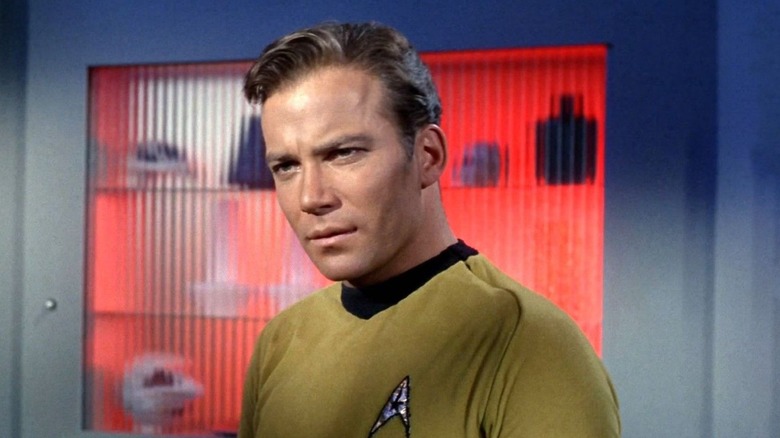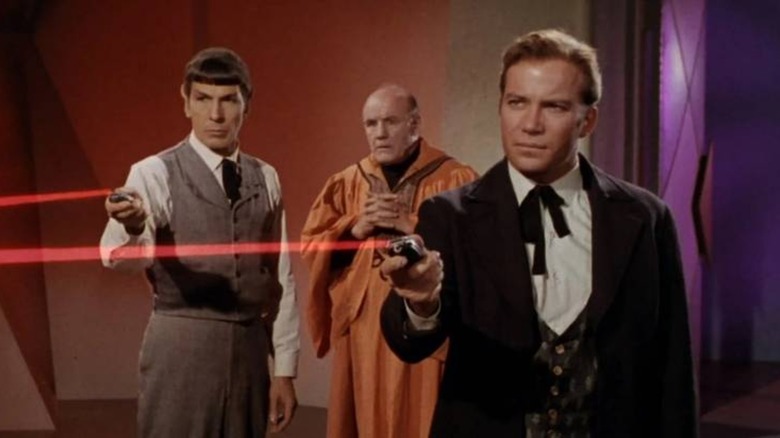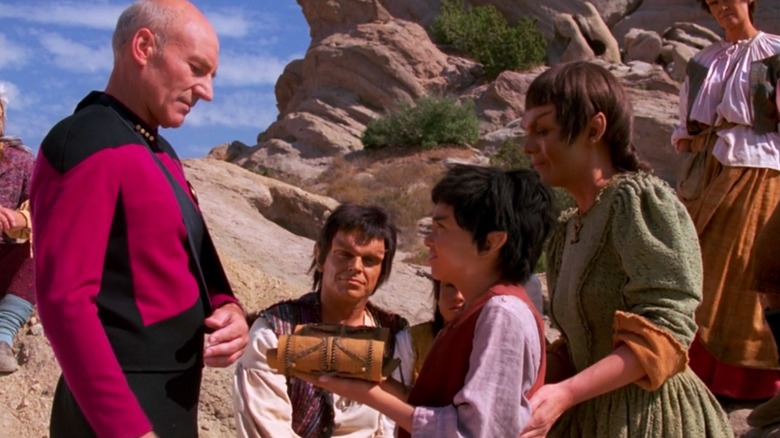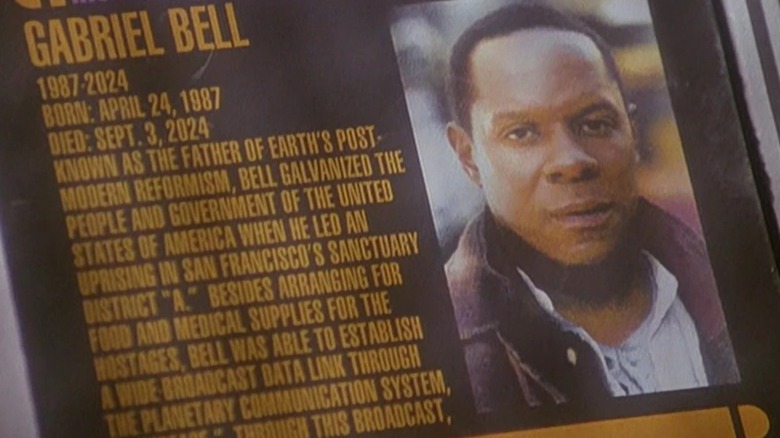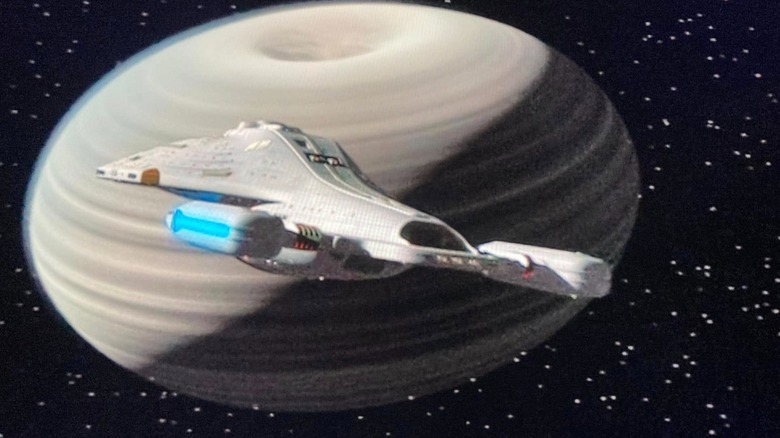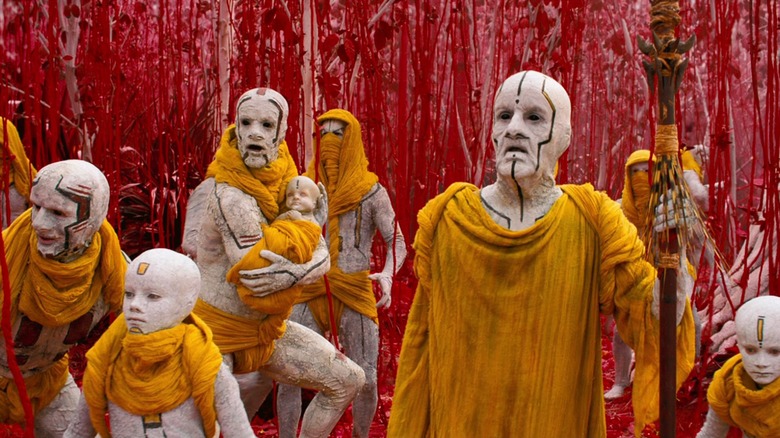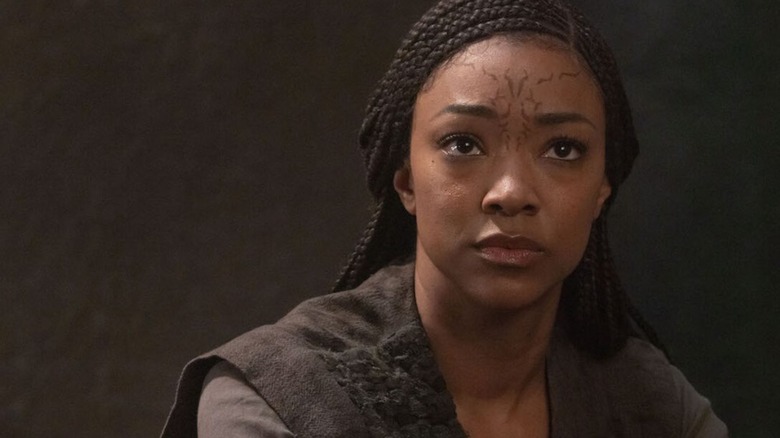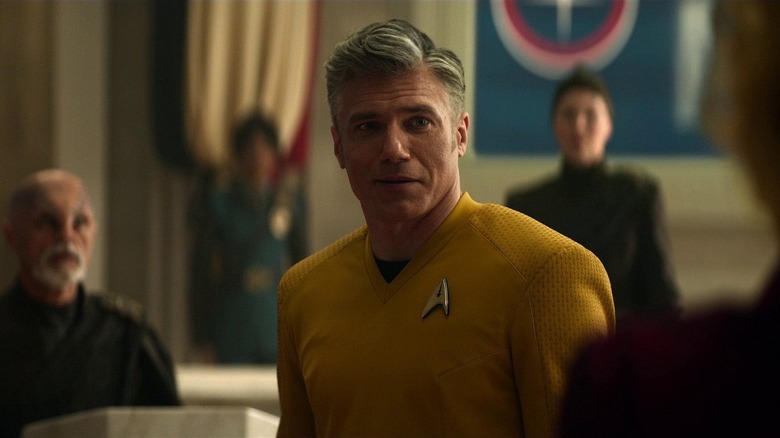7 Times Star Trek's Starfleet Captains Violated The Prime Directive
"Star Trek" has been around since the 1960s. Throughout its time in television, film, and other media, the franchise has introduced a lot of captains. Each one commands a particular starship or starbase, and they've all got their quirks. One of those quirks seems to be an ability to not only violate the Prime Directive, but also get away with it. It happens so often to some captains, it's essentially a character trait. Still, when a violation occurs, it's entertaining to see what happens and how it all unfolds.
The Prime Directive is Starfleet's guiding principle, known in-universe as Starfleet Command General Order 1. It's the Federation's overarching non-interference directive, which prohibits its members from meddling with an alien culture's natural development. This limits interaction with any pre-warp society, as doing so would disrupt their natural order, potentially upending a culture's ability to determine its own interests, scientific pursuits, and social norms, and even dooming a burgeoning civilization.
While it makes sense in general, the Prime Directive often gets in the way of actions that seem natural. It prohibits saving a culture from its own destruction if doing so reveals the existence of Starfleet, which can feel ethically wrong. Regardless, Starfleet wouldn't exist without the Prime Directive, though you wouldn't know that based on its most prominent captains. While many have violated the Prime Directive multiple times, only the most significant examples are delved into here. It's hard to disagree with their choices.
Captain Kirk explained and then immediately violated the Prime Directive
William Shatner pioneered the role of Captain James T. Kirk in "Star Trek," and he established many of the franchise's norms. This includes the Prime Directive, which was first mentioned and then violated in Season 1, Episode 21, "The Return of the Archons." The episode sees the Enterprise searching for the USS Archon, which disappeared nearly a century ago on Beta III. They discover a planet ruled by a being called Landru, which keeps the population in a zombie-like state that regularly undergoes a "Purge"-like festival.
The away team discovers that the Archon crashed due to Landru's interaction, which eventually leads Spock (Leonard Nimoy) and Kirk to discuss the Prime Directive. They mention its non-interference aspects, but then reason that, because Landru has stymied the cultural growth of the planet's inhabitants, the Prime Directive doesn't apply. It only applies to growing cultures, and Landru's presence denies growth. It's rules lawyering at its finest.
They finally discover Landru, a computer programmed by the real Landru 6,000 years earlier. They reason with the computer after its "Wizard of Oz" style reveal, explaining how it destroyed society's creativity, killed the people's free will, and should self-destruct. The Landru computer has a logic breakdown (of sorts) and complies. This frees the people of Beta III, so Kirk leaves behind a team of sociologists to aid in their development. The planet was briefly revisited in the "Star Trek: Lower Decks" episode "No Small Parts," discovering that Landru had reactivated, and noting that following up on fledgling societies should be better handled by Starfleet.
Captain Picard proves he's not a god to the Mintakans
Captain Jean-Luc Picard (Patrick Stewart) has made some excellent decisions throughout his time in Starfleet, and some involved violating the Prime Directive. One of the more interesting examples is inadvertent — Picard is well aware of Starfleet's guiding principle. In Season 3, Episode 4, "Who Watches The Watchers," the USS Enterprise-D arrives at the planet Mintaka III to resupply a Federation observation outpost that has been studying the Mintakan people.
The culture is far from warp-capable, existing in a comparative Bronze Age of development. When the tech hiding the facility malfunctions, a Mintakan witnesses it and is also harmed by an electrical shock. This pulls in Dr. Crusher (Gates McFadden) to render aid, transporting him to the Enterprise. This violates the Prime Directive, so she wipes his memory to counter the problem. It doesn't work, leading to more problems as everything spirals out of control. The secrets of the Enterprise and Captain Picard are ultimately revealed to the people.
"The Picard" is then seen as the Mintakan's god, which forces the captain to step in and directly violate the Prime Directive. He goes to the surface and insists on his own mortality, which is proven when he's shot with an arrow. He later returns and explains that the outpost will be removed, allowing them to develop on their own. While the episode's ending demonstrates Picard's desire to adhere to the Prime Directive, by this point, the damage is done.
Captain Sisko violated the Temporal and Prime Directives in one go
"Star Trek: Deep Space Nine" features several violations of the Prime Directive, though the best example unfolds in the two-part story from Season 3, Episodes 11-12, "Past Tense." The story begins with Captain Sisko (Avery Brooks), Dr. Bashir (Alexander Siddig), and Lt. Dax (Terry Farrell) being accidentally transported to 21st-century San Francisco due to a transporter malfunction. They arrive in August 2024 (29 years into the future when it aired), and are placed within the city's "sanctuary district."
These are sectioned-off slums that contain the poor, sick, and disabled. Sisko recalls the Bell riots from Earth history, which was a watershed moment centered around Gabriel Bell (John Lendale Bennett), a leader who sacrificed himself while protecting hostages. This results in widespread societal change for the better, so it's clear that the future visitors must not interfere. Doing so would violate the Prime Directive (and the Temporal Prime Directive), but fate forces Sisko's hand.
He's compelled to take Bell's place after he's prematurely killed, standing in and placing his own life in jeopardy to save history. In doing so, Sisko and the others are able to ensure events play out as they should, restoring the timeline before finding their way back to the 24th century. When they return, the timeline is the same, save for one minor change. The historical records now show Sisko in place of Bell's image, leaving Sisko's Prime Directive violation as an indelible mark on Earth's history.
Captain Janeway fomented an entire religious society due to Voyager's presence in orbit
Of all Starfleet captains, Captain Kathryn Janeway (Kate Mulgrew) is arguably the fiercest. She's had to violate both the Prime Directive and Temporal Prime Directive on multiple occasions, and not because she wanted to. Sometimes her situation forces her hand. With her ship stuck 70,000 light-years from the Alpha Quadrant, she often had little choice. That includes the time she inadvertently guided the entire history of a planet in Season 6, Episode 12's "Blink of an Eye."
In the episode, the Voyager becomes stuck in the orbit of an unusual planet that rotates 58 times per minute. As a result, time is exponentially faster on the ground, while little time passes on Voyager. As Janeway and her crew attempt to leave, the people on the planet see the starship, naming it their god, Ground Shaker, due to the quakes caused by its presence. The Doctor (Robert Picardo) spends years on the surface while seconds pass on Voyager, learning how their presence has completely shaped the planet's culture.
Eventually, the society, which was pre-industrial upon Voyager's arrival, advances to the space age, and the two interact. This happens violently at first, but is ultimately resolved. Voyager then breaks free of the time distortion field and the planet's orbit. Regardless, Voyager, with Janeway in command, shaped the history of a planet over centuries. On the technical merits, that is one of the most egregious violations of the Prime Directive in Starfleet history.
Captain Kirk saved Spock, revealing the Enterprise to the Nibrians
Since his introduction, multiple actors have played Captain Kirk. Two of these have violated the Prime Directive. After William Shatner, it was Chris Pine's Kirk in "Star Trek: Into Darkness" who did the deed. Unlike his previous incarnation, this Kirk got into a lot of trouble over it. In the film's opening scene, the Enterprise is undertaking a mission on the planet Nibiru to save the species from an impending volcanic eruption. To do so, the Enterprise is hidden beneath the ocean's surface while Kirk steals a scroll.
The Nibrians don't take too kindly to this and chase Kirk and Dr. McCoy (Karl Urban) through the jungle. This allows Spock (Zachary Quinto) to neutralize the volcano from within using Federation technology. Things go awry, and Spock's life is put in danger. Despite the Vulcan's warnings about the Prime Directive and his willingness to sacrifice himself to uphold it, saying "The needs of the many outweigh the needs of the few," Kirk disagrees.
He reveals the Enterprise to the natives while saving Spock, which has a significant impact on their culture. They abandon their faith and accept the Enterprise as their new god. Kirk's violation doesn't please Starfleet, so he's stripped of his command. Admiral Pike (Bruce Greenwood) resumes his position as the flagship's commanding officer, placing Kirk as his first officer. His demotion makes sense, as Kirk's actions effectively destroyed a culture's faith — despite saving them from annihilation.
Captain Burnham violated the Prime Directive when she saved Lt. Tilly and the planet Halem'no
Captain Michael Burnham (Sonequa Martin-Green) has never been great at following the rules. That's why she's imprisoned and stripped of her rank at the beginning of "Star Trek: Discovery." Eventually she regains her position, becoming captain of the USS Discovery. In Season 5, Episode 6's "Whistlespeak," she runs afoul of the Prime Directive. This isn't something Captain Burnham takes lightly, but she nonetheless does so to save Tilly (Mary Wiseman).
In the episode, Discovery arrives at the planet Halem'no while searching for clues to the season's overarching storyline. They discover a pre-industrial society, and several crewmembers beam down to the planet. As the story progresses, Tilly, in disguise as a native, is forced into a dangerous situation that would result in her death. Knowing that interfering would violate the Prime Directive, Captain Burnham ultimately intervenes, saving Tilly.
She later reasons that she'd have to fill out way too much paperwork for letting a good Starfleet officer die, in addition to what was needed for violating the Prime Directive. Regardless, they complete the mission and continue their investigation. Captain Burnham faced no repercussions for her actions, and the whole thing is swept under the rug while the Discovery proceeds on its primary mission. This is unusual, seeing as the violation was a flagrant abuse of the Prime Directive. Captain Burnham got away with plenty of things throughout the course of "Discovery."
Captain Pike saved the Planet Kiley 279 using Federation technology
"Strange New Worlds" began with its eponymous first episode, where Captain Christopher Pike (Anson Mount) takes the USS Enterprise to Kiley 279 in search of Commander Una Chin-Riley (Rebecca Romijn). As the mission progresses, Pike learns that the pre-warp people of Kiley 279 have reverse-engineered a matter-antimatter reaction used to power starships, after learning of the Battle near Xahea.
That incident closed out the second season of "Star Trek: Discovery," and the knowledge gleaned from it resulted in the creation of a Warp Bomb. Pike had little choice but to violate General Order 1 by revealing himself and the Enterprise to the planet's people. He does so to convince the planet's two warring factions to instead embrace peace and become part of something larger.
This was an attempt to avoid a devastating global war, and he references World War 3 in his speech, along with other historical moments. He explains how war ultimately led to the creation of Starfleet (and the Federation). Pike's speech works, and he helps guide the planet towards a nonviolent solution. The result of his violation wasn't punishment. Instead, Starfleet opted to place a greater emphasis on General Order 1 by making it the guiding principle of Starfleet. That's why, in retroactive canon, it became known as the "Prime Directive." While Pike's actions are noble, they nonetheless also showed how violating the Prime Directive can have a significant impact.
